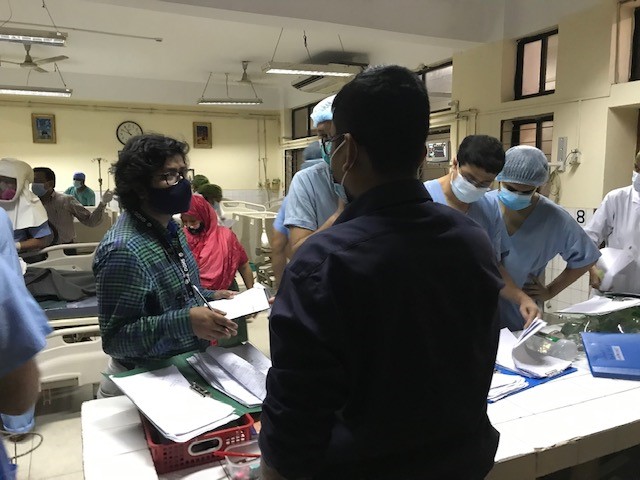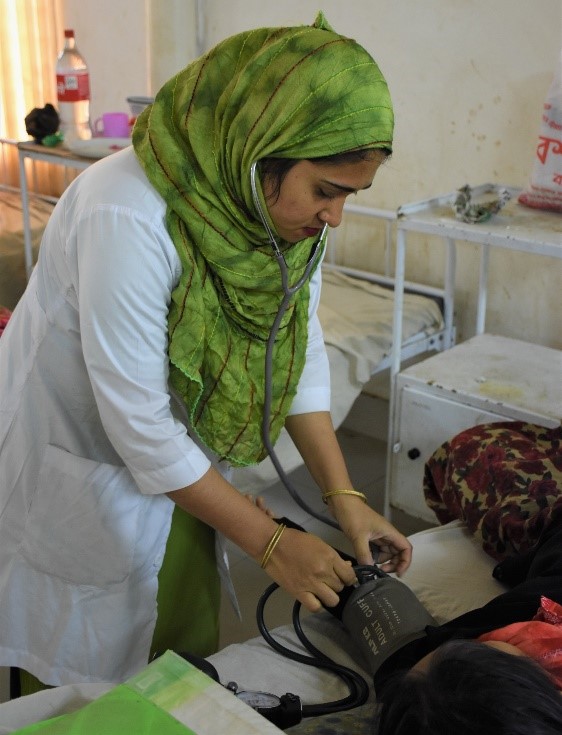Patient safety is a fundamental principle of healthcare and is recognized as a large and growing global public health challenge. This principle is also recalled in the People's Republic of Bangladesh constitution, article 15.1, which enunciates that the State will ensure essential healthcare services to all citizens. The principle was reaffirmed in 2011 in the National Health Policy, with the three specific objectives of ensuring primary and emergency healthcare for all, enhancing equitable quality healthcare and accessibility, and promoting preventive healthcare services.
WHO has been providing support to the Government of Bangladesh in prioritizing patient safety actions through the review and launch of the Global Patient Safety Action Plan 2021–2030, and in improving the health services delivery in the country through several initiatives, including the development of the Bangladesh National Health Care Quality Strategy of the Ministry of Health and Family Welfare.
WHO has also supported the launch of the health facilities assessment, an important initiative for the health sector development at the national level, providing the technical guidelines for improving the quality of patient care at three levels of health facilities, such as medical college hospitals, district hospitals and upazila health complexes. The latest assessments of health facilities, run in 2017, 2018 and 2019, evaluated over 510 health facilities that offer outpatient and inpatient services in preventive, diagnostic and curative areas. The results, which showed a significant performance improvement, are publicly accessible through an online real-time dashboard, which offers data, indicators and guidance to healthcare providers and policymakers.

Health facility assessment in tertiary hospital. WHO Bangladesh/ Murad Sultan
WHO has been working to ensure that patient safety is adequately addressed at the community level by guaranteeing access to quality primary healthcare, a critical step towards Universal Health Coverage. In 1998, with technical support from WHO, the Government of Bangladesh introduced community-based healthcare through the community clinics (CC) to create a one-stop primary healthcare service into rural communities. An independent evaluation of the community healthcare services demonstrated that the community clinics are successfully meeting the needs of the rural populations. The community clinics also play a significant role in preventing infectious diseases, screening hypertension and diabetes and running health promotional activities, especially in hard-to-reach areas where they provide core services for maternal and neonatal health, immunization and nutrition.
To ensure patient safety and quality healthcare in both rural and urban areas, the Government of Bangladesh is specifically tackling noncommunicable diseases (NCDs), which are the leading cause of death in the country, far surpassing infectious diseases. NCDs are very often related to other complications, leading to premature death or lifelong disability. The treatment of these chronic diseases is often expensive and lifelong, and high out of-pocket spending pushes people, especially poor households, below the poverty line.
WHO provides technical support to the Government of Bangladesh to ensure quality care and patient safety in managing and preventing NCDs. An essential step on this path is adopting and implementing the Multisectoral Action Plan for Prevention and Control of Noncommunicable Diseases, a strategy spanning from 2018 to 2025 and involving nearly 30 ministries and agencies. This national strategy aims at guiding, mobilizing and obtaining the commitment of different sectors to develop and shape policies to prevent population levels of risk factors for NCDs, such as tobacco use, unhealthy diet, physical inactivity, harmful use of alcohol, and exposure to poor air quality.
WHO has supported the Government in developing and implementing a national protocol for managing hypertension, diabetes, chronic obstructive pulmonary disease, and asthma in primary healthcare settings to prevent diagnostic and medical errors or other preventable harms to patients. Furthermore, WHO is also assisting the Government in strengthening primary healthcare workers' capacity by promoting team-based care and task shifting, screening and early detection to avoid patient adverse outcomes and ensure the continuous supply of medicines, consumables, and equipment.

Following a dedicated training, a nurse accurately measures a patient’s blood pressure in an Upazila Health Complex. WHO Bangladesh/ Farzana Dorin
A key component of patient safety is the accessibility of safe blood transfusion services, an essential condition for achieving Universal Health Coverage. In Bangladesh, over 800 000 blood units are collected every year. Following its Global Blood Safety Policy, WHO has developed guidelines on the clinical and rational use of blood, promoting blood component use for patients, improving blood testing to ensure patient safety, and screening HIV, Hepatitis B and C, Syphilis and Malaria. The improved blood transfusion services have been expanded to 219 health facilities throughout the country.
In Bangladesh, comprehensive patient safety also needs to address severe acute malnutrition (SAM), a life-threatening condition and one of the most common causes of morbidity and mortality that particularly affects children under 5 years. Many severely malnourished children die at home without care, an emergency that needs prompt intervention, and proper management following standard guidelines. To facilitate the use of the National SAM Guideline by medical professionals, in 2021, WHO assisted the National Nutrition Services in developing a pocket guideline for SAM treatment.
Nutrition is an essential human need, and therefore it requires particular focus in the effort to ensure patient safety. A proper nutrition management is essential to enhance the immune response in a person suffering from a viral infection, as poor or inadequate nutrition can weaken the immune system. Once again, COVID-19 pandemic has shown how important appropriate nutrition and dietetic interventions are in the response and recovery processes. In 2020, the National Nutrition Services, technically supported by WHO, have developed the Nutritional Management guidelines to treat COVID-19 patients.
Patient safety is at the very core of Universal Health Coverage. WHO remains committed to supporting the Government of Bangladesh in ensuring quality healthcare services and implementing evidence-based preventive measures to secure the health, social, and economic well-being of Bangladesh's present and future generations.
